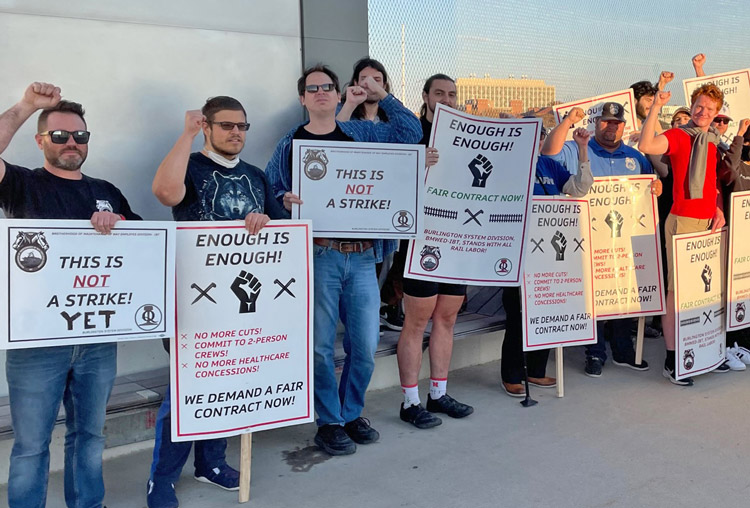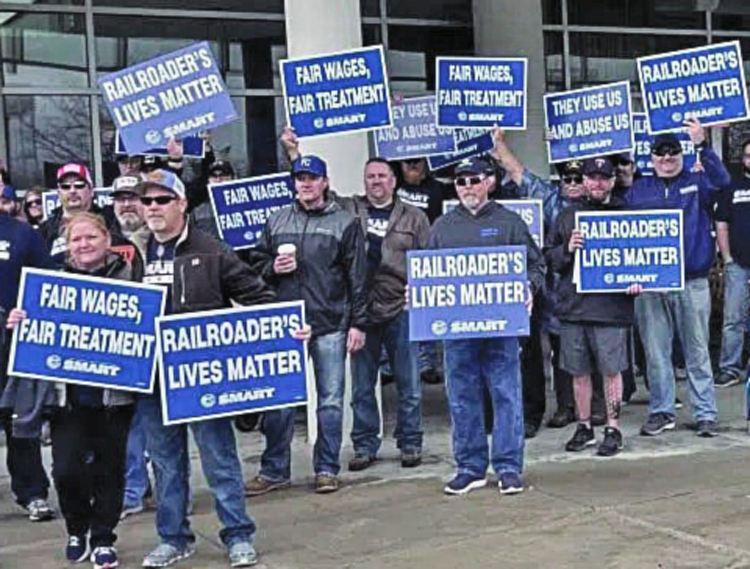LINCOLN, Neb. — It has become increasingly clear to a growing layer of working people over the last year that the fight of the rail workers and their unions against the profit-driven rail bosses and their government allies in Washington is a class against class struggle.
All 12 rail unions agreed to strike Dec. 9. “Across each Class 1 railroad system we have strike signs ready in every lodge, phone banks are in place, elected picket captains, mapped-out railroad entrances for picketing,” Jakob Forsgren, a welder, track repair worker and chair of local Lodge 1320 of the Brotherhood of Maintenance of Way Employees here, told the Militant.
The majority of rail workers, and four of the crafts, have voted to reject proposed contracts that far from meet the needs of the workers. Key issues the bosses have refused to address include livable schedules and hours, increasingly dangerous working conditions, time off when needed, paid sick days and an end to onerous attendance policies.
Meanwhile, the rail barons have raked in record profits, made unprecedented payouts to investors and raised prices on shippers. Their coalition — the National Carriers’ Conference Committee — rejects any further negotiations, relying on their friends in Washington to use the notorious anti-labor Railway Labor Act to quash any strike action and force the rejected contract down workers’ throats.
President Joseph Biden obliged Nov. 28, saying he would ask Congress to take bipartisan action to bar a strike and impose the contract. While claiming he was a “proud pro-labor president,” Biden proved his real sympathies, saying, “I believe Congress must use its power to adopt this deal.”
Democratic Party leader Nancy Pelosi put on the same act. Announcing she would put a strikebreaking motion on the floor of the House Nov. 30, she then masqueraded as a “friend of labor,” saying, “We must recognize that railroads have been selling out to Wall Street to boost their bottom lines, making obscene profits while demanding more and more from railroad workers.” Then she said her bill wouldn’t contain any “changes to the negotiated terms” — that is, terms voted down by the majority of rail workers.
Republican leaders let on they’d be glad to pitch in. Sen. Roger Wicker from Mississippi praised Biden for “the big boy thing to do.”
These announcements came just a few hours after the U.S. Chamber of Commerce, National Association of Manufacturers, National Retail Federation and hundreds of other boss associations wrote to Congress to demand they intervene and block a strike.
Rail bosses responded to the moves in Washington with glee. “Congress has historically acted with haste in a highly bipartisan manner and that’s our goal again here,” Association of American Railroads Chief Executive Ian Jefferies said.
The fight continues
Many workers are angry. “National media coverage misrepresented the gains in the contract as a victory,” Jordan Boone, a SMART-TD conductor in Galesburg, Illinois, told the Militant. “Workers feel like they’ve been wronged. Why vote for something that we don’t 100% like. Some of us would rather be forced by Congress to take something than vote to take something we are not on board with.”

As the crisis of capitalism deepens, bosses are turning to their governments to break strikes in a number of countries. The day after Biden proclaimed his strike-breaking plan, Yoon Suk-yeol, president of South Korea, announced he had invoked strike-busting laws to issue an unprecedented back-to-work order on 2,500 striking cement truck drivers. Failure to comply could lead to revocation of driving licenses, massive fines and three years in jail.
The union responded with 16 rallies around the country, saying they intended to defy the start-work order. (See article.)
After the Canadian provincial government in Ontario passed Bill 28, a draconian anti-strike law, some 55,000 school workers defied it and went on strike for two days in the beginning of November. They were backed by widespread solidarity actions. The government blinked, and Premier Douglas Ford announced the law would be rescinded, including the threat of retaliation against workers and the Canadian Union of Public Employees, their union. Negotiations resumed and workers are voting on a contract offer now, threatening to strike again if it’s voted down.
These examples teach important lessons. A law is just a piece of paper. The class struggle and relationship of class forces are what decides if anti-union government moves can be enforced.
How can rail workers best advance their fight against the bosses and their government here? Supporters of the Militant who work on the railroad and elsewhere are asking their co-workers, what do you think rail workers need to do?
“No one wants to strike but it’s the only tool labor unions have. We’re not asking for more than having some time off to spend with our families without being harassed by the boss instead of on call 24/7,” Lance Anton, a SMART-TD member and conductor here in Lincoln, told this Militant correspondent. “It’s not like the railroads can’t afford to let us have time off with the billions of profits they make each year. They are the ones holding consumers’ and shippers’ feet to the fire, not union members. If your house is on fire, you call firefighters. The rail unions are the firefighters against the railroad employers’ repressive attendance policies, increasing harassment and unsafe working conditions.
“I voted no on the proposed agreement, too much was left up to future negotiations, railroad by railroad,” he said. “We need to fight nationally, use our union power.
“The reason over 60% of the yardmen in the SMART-TD voted against the proposed agreement,” he pointed out, “is because of increasing harassment against the workers who make up the trains in the yard. They’re constantly under the eyes of rail bosses hiding in the weeds, spy cameras and drones all to push speedup and an unsafe work environment. And if you put in a personal injury report, intimidation from the bosses increases.”
Anton joined fellow rail workers to collect over 30 signatures from co-workers on a message of solidarity sent to the Canadian Union of Public Employees school workers in Ontario.
“Their fight needs to be emulated by the U.S. rail unions against the anti-labor laws of the U.S. government that only aid the railroad employers,” Anton said.
There is interest and solidarity with rail workers from fight-minded workers and farmers. “It’s not only the rail workers who are being abused,” Perry Stevenson, a Lincoln truck driver and member of Teamsters Local 554, told the Militant. “We are so short of drivers, the boss pressures us to break the 14-hours-of-service law limit daily. My union has been fighting for more time off for two years. I support rail workers in their fight to win their quality-of-life goals.”
Larry Ginter, a veteran farmer activist from Rhodes, Iowa, advocates the need for an alliance of working farmers and unionists to back the rail workers. “I think city folks are allies of working farmers. They make what we need to produce the food that feeds the country and others around the world,” he said. “I believe that workers need a living wage and farmers need to make enough to meet the cost of production and take care of their families. If the rail workers need to strike to get their demands met, so be it.”
It is through being part of the resistance taking place today, and building solidarity, that workers can learn and prepare for the bigger battles to come. This is the road to strengthen the labor movement to act in the interests of all working people.


